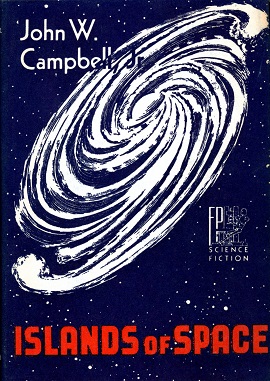Islands of Space

Dust-jacket from the first edition
|
|
| Author | John W. Campbell, Jr. |
|---|---|
| Cover artist | Ric Binkley |
| Country | United States |
| Language | English |
| Series | Arcot, Morey and Wade |
| Genre | Science fiction novel |
| Publisher | Fantasy Press |
|
Publication date
|
1957 |
| Media type | Print (Hardback) |
| Pages | 224 pp |
| OCLC | 3613703 |
| Preceded by | The Black Star Passes |
| Followed by | Invaders from the Infinite |
Islands of Space is a science fiction novel by author John W. Campbell, Jr.. It was first published in book form in 1957 by Fantasy Press in an edition of 1,417 copies. The novel originally appeared in the magazine Amazing Stories Quarterly; the text was "extensively edited" for book publication, with Campbell's approval, by Lloyd Arthur Eshbach. A paperback edition was published by Ace Books in 1966. In 1973, Islands was included in a Doubleday omnibus of all three "Arcot, Wade, and Morey" novels. A German translation appeared in 1967 as Kosmische Kreuzfahrt, and an Italian translation was published in 1976 as Isole nello spazio.
Islands of Space is generally credited with introducing the concepts of hyperspace and the warp drive to science fiction.
The novel concerns the adventures of four heroes, Arcot, Morey, Wade and Fuller.
Theodore Sturgeon, reviewing the Fantasy Press edition, wrote "This is a real lousy book", faulting its lack of characterization, suspense, and plot, and a writing style "such as would dry up the purple blood of the sleaziest fan magazine". "BUT --", he continued, "Islands is a Voyage far afield and a catalogue of the marvels of other-where, ... a cornucopia of technological and mechanistic matter, both real and extrapolated, poured out prodigously and with abandon, [and] a narrative which could not occur without its science -- the purest, and almost the rarest form of science fiction. Sturgeon concluded "It is high time and past time for [science fiction] to infuse itself with the rich hot blood of the old space-opera".
P. Schuyler Miller wrote that the book version "has been carefully modernized, [but] it's old-fashioned now. It is also very characteristic of the best "hard" science fiction of its day. This is reportedly the first published use of the term hard science fiction.
E. F. Bleiler described the original text as "Greatly overloaded with unnecessary (although at times ingenious) exposition, hence almost unreadable; weak novelistically; and cliched in its action plot."
...
Wikipedia
